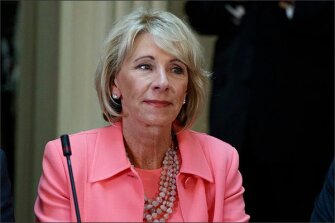
After years of frustration in her attempts to expand education choice, U.S. Secretary of Education Betsy DeVos is picking up steam.
Fresh evidence that DeVos is continuing her push to prioritize choice with federal funds can be found in the April 24 edition of the Federal Register. That’s where the U.S. Department of Education announced a new proposed grant priority for its Office of Special Education and Rehabilitative Services. The priority would affect State Personnel Development Grants that help train those working in special education.
“We take this action to focus attention on the need to improve results for children with disabilities by empowering personnel to select professional development activities to improve their ability to serve children with disabilities,” DeVos’ agency states in the Federal Register.
The notice doesn’t provide more details about what it would mean for special education staff to “select” PD activities, although the language itself is relatively straightforward. In its current budget, the State Personnel Development Grants program gets $38.6 million. You can learn more about these personnel development grants here. These grants are discretionary and don’t go out by a pre-set formula.
This announcement lines up with at least two other recent moves by the Education Department to embed at least the concept of money in different parts of the federal education budget.
In early March, we reported that DeVos was developing vouchers for teachers to use for professional development using Education Innovation and Research grant money in the Every Student Succeeds Act. (It’s unclear exactly how much would go for these vouchers, although the entire EIR program got $190 million in the current budget year.) And earlier this week, DeVos announced $180 million in federal coronavirus grants that in part would provide money to families to spend on a variety of public and private education services—a concept that resembles a voucher program.
The Education Department’s position is that the teacher PD vouchers that rely on ESSA money, and the grants for special education staff, represent different priorities but have similar approaches. In a climate where getting professional development through traditional means might be very hard, some might see this as a natural way for teachers to get PD independently.
The Bad Old Days, or a New Frontier?
It’s far from unusual for different administrations to set priorities for grants of various kinds. For example, DeVos has previously prioritized education grants that align with the Trump administration’s Opportunity Zones, which aim to spur economic development in struggling communities.
In a statement last year discussing why teachers should have more autonomy over their PD, DeVos said, “They have little to no say in the courses they take. They have very little freedom to explore subject areas that interest them.”
But in response to the idea of a voucher-like system for special education teachers’ PD, American Federation of Teachers Randi Weingarten—a frequent DeVos critic and opponent—called the idea a “sham” and said that to propose it during the coronavirus pandemic was irresponsible.
“The DeVos proposal is not only ineffective, it’s a waste of federal money, and will hinder, not help, teachers reach the students who need the most support,” Weingarten said. “Teachers are eager to get back to classrooms, particularly to assist their students with special needs, but they see professional development as an opportunity for collaboration, enhanced learning, and critical guidance—not a bone to throw or a box to check.”
Sen. Michael Bennet, D-Colo., wrote to DeVos last month saying that her teacher PD plan that relied on Every Student Succeeds Act money violated both the “spirit and intent” of the law.
Public comment on the proposal is due May 26.
Photo: U.S. Secretary of Education Betsy DeVos (Evan Vucci/Associated Press)
